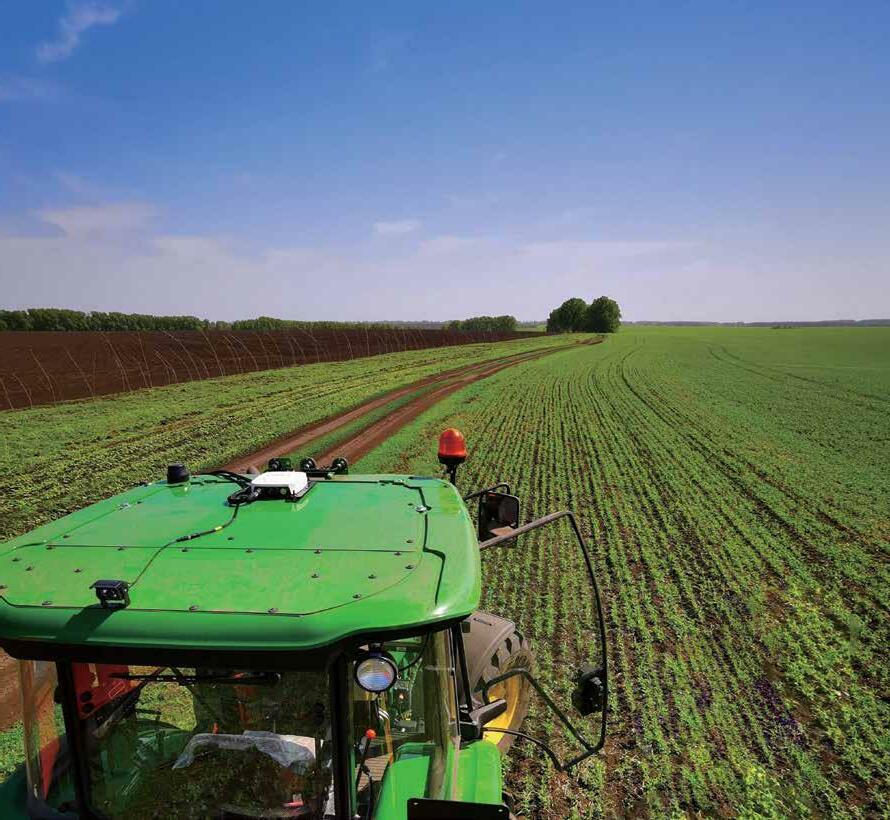
33 minute read
Organization Making Poultry Farming Affordable in Africa
Poultry farming is a lucrative market in Africa due to the inability to maintain them. The feed for chickens has rapidly increased and the banks don’t want to lend to small farmers. The demand for poultry is rising in Africa — and few places supply it.
Advertisement
They often import chicken and eggs from other countries. However, this is costly and products can arrive damaged. Here are some ways poultry farming in Africa can become more affordable.
Get Funding Although most banks aren’t likely to give money to lesser-known farmers, some grants are available to them. These help people begin their shot at the poultry market by starting a farm.
The odds aren’t great because some farmers try to start with too many chickens to cash in on the need for poultry in the area. However, if you don’t know what you’re doing and don’t consider factors, you could be more in over your head than you realize.
Chicken Initiative
Agriculture is the fastest-growing market in Africa. Farmers there, however, don’t have access to research facilities to assist them with their breeds. African chickens need more of the high-priced feed than other birds in the market and African farmers don’t have access to broiler birds, which are good for meat.
The International Livestock Research Institute (ILRI) is leading an initiative called The African Chicken Genetic Claims project. Their main goal is to change the genetic makeup of chickens and make them more productive for Africans with small farms.
The Bill & Melinda Gates Foundation provided $21.4 million and a four-year plan in 2017 to The World Poultry Foundation. The mission is to improve chicken genes and poultry production in Tanzania and Nigeria.
The grant impacted about 2.5 million households in the four years after they donated. The end goal here was a sustainable supply chain that would provide healthy chickens to entrepreneurs in small farming in Africa.
Chicken Breeds
Throughout history, there have been over 200 breeds of chickens developed for different agricultural needs. Many chickens have common characteristics, although they aren’t of the same species and have another purpose from their counterparts.
Chickens are grouped by their breed based on their physical origin and characteristics. The main large groups are Mediterranean, American, Asian, Asiatic and English. Many breeds fall into these categories, ranging from soft-feather species to hard-feather ones.
Junglefowl is possibly the original prototype for creating different breeds. There are three main types of these birds classified by their coloring and existence in other parts of the world. Green, grey and red junglefowl are often in the wild or on domesticated farms and homes.
Choose Poultry
Farmers use different types of chickens for different kinds of poultry. When starting a business, like a farm, you must decide what sort of chicken you’ll need for the goods you want to provide. Broiler chickens produce meat and layer chickens are for laying eggs.
The most lucrative areas of poultry in South Africa are raising chicks, incubating them and making meat and eggs. Choose one type of chicken to start with to gain experience and further your knowledge of poultry before you try to expand your market.
Creating Affordable Poultry Farming in Africa There are millions of Africans suffering from poverty that stand to gain a profit from potential poultry farming. Not only would they be monetarily benefiting, but they would also be fulfilling a need in their community and household.
Individuals looking to begin farming in South Africa should apply for a grant and try to find an experienced farmer to learn from before they start. Smallholder farms are a growing trend in Africa that can use initiatives and assistance to bring more jobs and a sustainable market to their society.
Finding a Balance Between Pesticides and Organic Pest Control Methods

Africa’s agricultural sector has long been a vital economic player and food source for feeding the continent’s growing population. Yet, in a world where the effects of climate change are rampant, the agriculture industry has become littered with unruly pests that threaten crop production and accrue catastrophic financial ruin worth billions of dollars.
Global warming has made agriculture conducive to pests, already destroying about 40% of global crops and amounting to $220 billion in losses. Currently, Africa’s annual crop losses due to insect pests are even higher than the worldwide average at 49%, driving the number of foodinsecure people upward.
The world has already witnessed these impacts as 21% of Africa’s population became food insecure during the coronavirus pandemic in 2020, equating to 282 million people. crop growth. One study found regular pesticide applications negatively impact 70.5% of soil invertebrates and their biological services.
Additionally, pests develop a resistance to the chemical compounds that target their populations. When pesticides are continuously used in agriculture, scientists believe the insects mutate and alter their genetic makeup. For instance, if one insect survives pesticide exposure and breeds with another insect, the offspring inherit a new genetic trait that breeds a pesticide-resistant population until chemical applications are rendered ineffective.
A 30-year-old World Health Organization (WHO) analysis found that pesticides kill about 20,000 people yearly – a study that hasn’t gone under review since. Nevertheless, the dire implications of overusing pesticides in agriculture call for a newer approach.
While pesticides and insecticides are standard in the agricultural sector, long-term use is highly toxic and ecologically harmful to croplands. As such, there’s an increasing demand for more affordable, sustainable, and safer alternatives for adequate pest control. In fact, recent studies indicate that an integrated pest management approach could be far more effective.
The Problem With Pesticides
Soils are some of the earth’s most biologically complex ecosystems, hosting about one-quarter of the earth’s biodiversity and being essential for crop yields. Optimal soil fertility is fuel for unique growth processes related to soil structure, nutrient cycling, carbon conversion, and pest and disease control.
However, soil fertility is lost with each application of synthetic pesticides and insecticides, as is
An Integrated Approach to Pest Control
Pesticides’ impacts on ecological damage and failing crop health are troubling for Africa’s foodinsecure population, requiring more organic methods to prevent pesticide resistance and soil infertility while producing large quantities of healthy crops.
Although integrated pest management (IPM) doesn’t rid farms of pesticide use entirely, it applies as little as possible instead of relying on biocontrol methods like natural pest predation and monitoring to control unwanted insects.
In the United States, the U.S. Environmental Protection Agency (EPA) recommends following IPM’s four-tiered approach to control pests: • Action thresholds: Determining when action is needed for pest control, such as the level of pest infestation that threatens significant crop and economic losses. • Monitoring and identification: Accurately identifying pests and monitoring their growth to decide whether pesticides are needed. • Prevention: Utilizing measures to prevent pest threats, such as crop rotating, planting pest-resistant crops, and companion planting. • Control: Ongoing monitoring and identification of pests and evaluation of preventive and control measures are continuously effective.
IPM applies to commercial and residential plant growth as an environmentally sound and safe pesticide alternative. For example, U.S. homeowners may have grubs. These are shrimp-like bugs that thrive in the soil beneath the lawn and chew on roots that leave grass with unsightly brown spots. Knowing the toxic effects of pesticides on soil health and following the IPM principles can ensure you have a green, grubfree lawn for years to come.
IPM also helps reduce pollinator deaths, further boosting crop yields. A recent study found that IPM watermelon saw a 129% increase in wild bee pollination, which resulted in 26% higher yields.
Farmers in Africa can utilize new technologies to assist them with an IPM approach. For instance, a new mobile phone app called Push-Pull aims to help farmers grow potent companion plants that repel fall armyworms naturally. Upon the technique’s initial adoption, farmers reported a significant reduction in fall armyworm populations and crop yields that had either doubled or tripled.
Getting to the Root of the Problem
Pesticides have their place in agriculture. However, an integrated approach has far greater potential as an effective pest control method. The real challenge lies in helping Africa’s farmers implement IPM while ensuring they have the correct tools, crop varieties, and incentives to change their farming practices.
Bio:
Jane is an agriculture and environmental journalist and the founder and editorin-chief of Environment.co, where she covers sustainability and eco-friendly living.
Migrant workers to collaborate with experts on new study to analyse impact of post-Brexit visas
Migrant care home and agricultural workers will co-create new research to analyse the impact of new visa rules introduced following Brexit.
The research will show more about living and working conditions of those who arrive in Britain to work on farms and with the elderly.
The project is among the first studies to be undertaken in the context of the new migration regimes following the end of free movement between the UK and the EU. It aims to analyse the effects of the visa conditions attached to short-term migration schemes on people’s vulnerability to exploitation. This includes access to protective labour market structures, such as union membership, and statutory enforcement and redress, for example through employment tribunals, and whether it creates vulnerability to exploitation.

The Seasonal Worker Visa (SWV) allows workers from a range of countries to enter the UK to work in agriculture for periods less than six months and limiting their right to change employers. A Health and Care Worker visa allows medical professionals to come to or stay in the UK to do an eligible job with the NHS or in adult social care. Researchers will discover more about the working conditions of agricultural and care workers by engaging support workers in charities and NGOs to conduct interviews.
Dr Inga Thiemann from the University of Exeter, who is leading the project, said: “We want to centre migrant workers’ own voices and their lived experience in these sectors. We want to find out how they view their working conditions and which support they think would be useful to them. We feel it is important to base policy suggestions on that lived experience.”
The research project is led by the University of Exeter, in partnership with the University of Bristol, the University of York, and the University of Durham, as well as NGOs Focus on Labour Exploitation (FLEX) and the Joint Council for the Welfare of Immigrants (JCWI), with support from UNISON. It is hoped the findings will be used by policymakers in the future.
The team and their frontline NGO partners will conduct a survey and in-depth qualitative interviews and focus groups with migrant workers and their representative organisations on their experience of work, their bargaining power and access to protective mechanisms, as well as what they would like enforcement mechanisms to look like. The researchers will also carry out desk-based research on ongoing changes to the labour market and new visa regimes prompted by Brexit, Covid-19 and recent legislative initiatives.
Dr Thiemann said: “There is growing evidence that both insecure visa regimes and insufficient labour protections contribute to migrant workers’ vulnerabilities to exploitation, discrimination and modern slavery. This project will investigate the specific vulnerabilities experienced by migrant agriculture and care workers on the new postBrexit visa regimes.
“This project will actively engage migrant workers as co-creators of the research and collaboratively generate new data on their working conditions, experiences and risks of exploitation and access to protections and redress. It will also assess the suitability of the relevant laws and enforcement mechanisms to adequately protect workers.”
The project team also includes Dr Konstantinos Alexandris Polomarkakis, from the University of Exeter; Dr Natalie Sedacca, University of Durham; Dr Joyce Jiang, University of York; Dr Manoj Dias-Abey, University of Bristol; Meri Åhlberg, FLEX; Dr Lucila Granada, FLEX and Caitlin Boswell, JCWI.


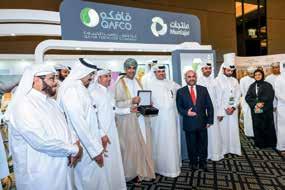

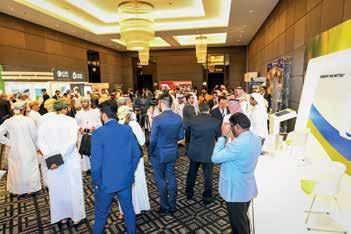
Within the framework of its NET ZERO activities, SÜDPACK has joined the Science Based Targets Initiative (SBTi) – and signed the commitment letter. The joint initiative of the UN Global Compact, Carbon Disclosure Project (CDP), World Resources Institute (WRI), Worldwide Fund for Nature (WWF) and others has set itself the goal of anchoring effective climate protection on a corporate level to limit global warming to 1.5°C.

SÜDPACK thus belongs to an international community of companies that share the same values and goals. But above all, the global film manufacturer is committing itself to even greater involvement in climate protection along the entire value chain, to involvement that is based on current findings in climate science – and is ensuring that its climate protection efforts are con-sistent with the highest standards of the Paris Agreement.
“It is based on our NET ZERO vision here at SÜDPACK that we are working hard on the sustained improvement of our carbon footprint,” emphasized Valeska Haux, VP of Strategic Marketing at SÜDPACK. “We are convinced that it will only be possible to effectively meet the challenges of climate change if industry, institutions, politics and consumers develop an even greater sense of responsibility, join forces and work together on pioneering solutions,” elaborated Haux.
The SBTi commitment letter was signed in April 2022. Within the next 24 months, SÜDPACK will submit concrete goals to the SBTi and have them val-idated. Scope 1 and Scope 2 will be taken into account as defined in the Greenhouse Gas Protocol standards, as will Scope 3 emissions, which have the greatest effect on SÜDPACK’s total emissions. Scope 1 emissions are direct emissions that are directly emitted by the company. This includes the company’s vehicles, incineration plants and refrigerants. Scope 2 comprises indirect emissions, such as those from purchased energy, steam, cooling, heating or also from business travel, waste, leased assets and capital goods. Scope 3 takes a look at the indirect emissions from upstream and down-stream activities, such as purchased materials and their transportation, dis-tribution and logistics, waste and employee commuting.
Concrete measures to reduce Scope 1 and Scope 2 emissions have already been executed or are in the implementation phase. Some examples include the increased use of energy from renewable sources as well as additional investments in photovoltaic systems at the production sites. Since early 2022, SÜDPACK has been sourcing 100% carbon neutral natural gas for all of its German sites, and energy supply has been shifted to 100% renewable energy. With its firm commitment to a circular economy and recycling, as well as further measures that involve waste and material management or e-mobility, SÜDPACK is also on the right track when it comes to Scope 3.
Insurance payouts vital to protect Malawian smallholder farmers
After Malawi and other countries in the region experienced an extremely dry 2021/2022 agricultural season, the Government of Malawi and a coalition of partners, joined forces to manage the risk and reduce the impact on vulnerable populations.
As part of its ongoing engagement with the country, a delegation from the Africa Risk Capacity (ARC), an African Union (AU) Specialised Agency tasked with helping AU Member States plan, prepare and respond to extreme weather events, met with the Government of Malawi and civil society in Malawi last year. The meeting was an opportunity to strengthen ARC’s relationship with the Government of Malawi, build on the work done in the country over the years, understand the needs of the country, and share insights on what ARC can offer as part of its weather insurance for climate resilience offering. This, as part of a comprehensive engagement programme, led to Malawi participating in the ARC risk pool to cover its 2021/2022 agricultural season.

According to the ARC Group Director General Ibrahima Cheikh Diong, ARC sees it as essential to align its solutions to national policies and strategies such as the Malawi National Disaster Risk Financing Strategy. This will enable the government to optimise the use of any resources made available towards enabling response efforts in the event of a natural disaster to benefit the most vulnerable, including any payouts from an ARC insurance policy.
“As [the] ARC, our job is to understand, support and complement Malawi’s disaster risk policy framework – among other things,” he said, addressing the attending delegates. “In the process, we are also interested in promoting the equal treatment of women and girls who are often the most vulnerable when climate disasters strike.”
Not long after this meeting, in January 2022, the World Food Programme (WFP) released its Southern Africa Seasonal Monitor results that confirmed the first stages of drought conditions in the region’s 2021/2022 season.
The Seasonal Monitor showed the OctoberDecember 2021 period to have been the driest in a long time, or second driest, since 1981 across a spread of countries (from northern Mozambique and southern Tanzania, to southern Madagascar, the Angola-Namibia border and most of Malawi,). Fortunately, the WFP predicts that recovery will be possible, “provided abundant and regular rains are received from January onwards, and that there will be no early end to the rainfall season”.
The Seasonal Monitor has also revealed that: certain areas have received up to about 30 percent less rain than usual; monthly deficits have decreased as we entered 2022, but conditions remain drier than average; and delays in the
availability of moisture for planting and early crop development have meant that the season was over five weeks late in kicking off. In addition to close monitoring of rainfall performance as the season progresses, an assessment of the extent to which vulnerable households have been affected is necessary. As stocks of certain staples become increasingly depleted, food prices are rising to accommodate transport costs to bring it in.
Taking his turn at the podium during the meeting, the Civil Society Network on Climate Change (CISONECC) national coordinator, Julius Ngo’ma, spoke on behalf of non-state actors under the banner of Multi-Actor Partnership (MAP).
While the government is the best source of information on exactly where any aid is most needed, “MAP brings together civil society, policy makers, the private sector, researchers and the media for a joint effort on pro-poor and humanrights-based approaches to climate and disasterrisk financing and insurance,” advised Ngo’ma.
In this regard, as part of the ARC Replica programme, an initiative that allows humanitarian actors to take out insurance on behalf of a country, the WFP remains a crucial cog in advocating for better risk-management systems and funding related to climate-change effects. In November last year, following a drought and pests that destroyed significant volumes of crops, up to 65,000 Malawian farming households received cash payouts amounting to US$2.4 million from a UN WFP agricultural insurance programme.
“Most farmers in Malawi rely on rain-fed agriculture but with the surging effects of climate change, livelihoods are cyclically disrupted and this fuels hunger,” said the Malawian Minister of Agriculture, Lobin Lowe, who attended the payout launch. “Scaling up crop insurance can enhance people’s capacity to anticipate and withstand shocks, and [can] mitigate their effects in the long run,” he enthused.
Says Lesley Ndlovu, ARC Limited CEO: “Agriculture is extremely important to African countries as it contributes one third of GDP and two thirds of employment opportunities and when you think about natural disasters they have the greatest and most disproportionate impact on small to medium scale farmers and in Africa currently 80%-90% agricultural output comes from these types of farmers.
“Parametric insurance accelerates the speed of pay-out because we can run the model quickly and pay out a claim to a farmer within weeks, allowing them to bounce back and continue investing in their farms.”
During the 2020-2021 farming season, farmers insured crops such as maize, sorghum, rice, groundnuts, pigeon peas and cotton to protect their income from harvest losses.
“With the changing climate, farming can be an uncertain business in Malawi, especially for smallholder farmers,” says Paul Turnbull, WFP Malawi Country Director and Representative. “Payouts are a springboard for farmers to continue their efforts in adapting to increased weather-related shocks, and in fighting both food insecurity and poverty.”
The ARC Group comprises ARC Agency, a specialised agency of the AU, and ARC Ltd, the financial affiliate of the Group. Together, the organisation supports AU member states to plan, prepare and respond to the negative effects of climate change.
https://www.nepad.org/news/arcs-weatherinsurance-under-spotlight-malawi World Food Programme (WFP)’s Southern Africa Seasonal Monitor, January 2022 https://www.un.org/africarenewal/magazine/ november-2021/farmers-malawi-receivecash-one-largest-insurance-payouts-africa
Tecno Announces New Customer-Centric Strategy and Refreshed Brand Identity
Tecno, a global leader in the design and manufacturer of housing systems for laying hens, recently announced its new strategy focused on helping customers find the right fit to reach their highest potential. Harry Luimes, Director and General Manager at Tecno, unveiled the strategy, including a refreshed brand logo and website, to employees and partners during the brand’s annual meeting.
“The egg business keeps changing, and those evolving standards mean more complexity for our customers. Helping customers navigate those challenges drives us every single day,” said Luimes.
“Tecno remains fully dedicated to the egg industry around the world, and we’re innovating to meet the needs of each customer while advancing the industry. Our strategy matches the right system to the customer’s operation, ensuring the highest performance in egg quantity and quality.” of experience to truly understand where our customers want to go and the right innovations to help them get there.”
Tecno’s brand identity has been refreshed as part of the new strategy. The Tecno logo has been modified to give it a streamlined look with a modern feel; ‘The Eggsperience’ tagline remains unchanged.
“The Eggsperience is much more than a tagline for us,” explains Luimes.
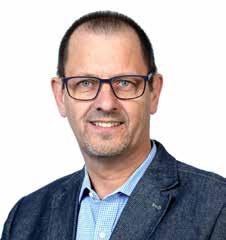
Harry Luimes, Director and General Manager at Tecno
“Our customers want their hens to be comfortable, safe and nourished,” added Stefan Caspari, Senior Vice President and General Manager, AGCO Grain & Protein. “Tecno uses decades ”It defines our process of standing with our customers from idea to installation and beyond to ensure their hens have the right environment to reach their highest potential.”
The website PoultryEquipment.com has also been redesigned for easier navigation and access to information. It features the brand’s broad range of solutions, turnkey projects, and expert tips.
The transition to alternative proteins continues, accelerated by consumers motivated by healthier diets and having a positive impact on climate
More than 30% of consumers would fully switch their diets to alternative proteins to make a positive climate impact, reports the first BCG and Blue Horizon multi-market survey of alternative proteins
Dramatic, above-inflation price increases for animal-based products over the course of the pandemic led to an unprecedented spike in the sales, funding, and public awareness of the alternative protein sector. Increasing global concerns about food security and climate impact have further fuelled this development. With 25% of global greenhouse gas emissions caused by the food value chain, the shift to alternative proteins may be the most capital-efficient and high-impact solution to addressing the climate crisis. Projected to represent at least 11% of all meat, seafood, eggs, and dairy consumed globally by 2035, alternative proteins will save 3x the emissions for each dollar invested compared with the next-best tool in the box—decarbonising cement—according to a forthcoming report from Boston Consulting Group (BCG) and the impact investor Blue Horizon.
The report, The Untapped Climate Opportunity in Alternative Proteins, will present findings from a survey of more than 3,700 consumers in seven countries (China, France, Germany, Spain, the United Arab Emirates, the United Kingdom, and the United States) regarding their reasons for trying alternative proteins and the inhibitors that keep them from buying even more. Three-quarters of survey respondents cited a healthier diet as their primary motivator for consuming alternative proteins, while more than 30% of consumers would fully switch their diets to alternative proteins if they believed doing so would have a major positive impact on climate.
Across all markets surveyed, consumers view alternative proteins positively: 76% are aware of the category, and approximately nine out of ten said they like at least some of the alternative-protein products they have tried. While consumers in China and Germany are the most willing to pay close to parity with protein equivalents, no consumer in any region is willing to pay a premium for alternative proteins that match meat for taste, texture, and nutrition—a price premium requires value add.
“Nearly one in three people across the world are plagued by food insecurity. Coupled with the impact of the continued geopolitical crises on the supply chain and food prices, there is immense pressure on the global food system,” says Ben Morach, a BCG managing director and partner. “Pivoting away from animal-based proteins will lead to shorter, more resilient, and potentially more local supply chains. Widespread adoption of alternative proteins can remove the risk of supply chain disruptions and play a critical role tackling climate change, with consumers playing a key part in propelling this transition.”

Bjoern Witte, CEO of Blue Horizon, adds: “The products consumers are seeing on the shelves today will be followed by a wave of cleaner, healthier, and tastier alternative proteins, as technology allows for increasing innovation. We’ve seen the fast-paced development of these technologies in our own portfolio as well as the wider food-tech industry, leading to an overall better consumer product range. This is great news for today’s consumers, but we’re just at the beginning, really. Future generations will benefit greatly from the demonstrable impact this will have on the environment, as shown through our analysis of climate data. This is the second report from BCG and Blue Horizon confirming that protein transformation is the most capital-efficient way to avoid emissions and deliver Impact of Capital Employed (IoCE). If we reach 11% market penetration by 2035, which is our goal, we could save more carbon emissions than decarbonising 95% of the aviation sector. The positive impact is absolutely massive, and secular drivers have never been stronger—the time to invest is now.”
An acceleration in funding
Capital invested in alternative proteins rose at an annual rate of 124%, from $1 billion in 2019 to $5 billion in 2021, with investments in fermentation and animal-cell-based companies leading the way. Investment in alternative proteins is increasingly global. Middle East funders, which tend to focus on animal-cellbased investments, made up 11% of worldwide investment in alternative proteins last year while APAC investment, fuelled by plant-based deals, increased by 92%.
For investors, a key finding of the report is the fact that investments in plant-based proteins are more CAPEX-efficient with regard to carbon dioxide and methane emission reductions than in any other industry. Plant-based protein market penetration as forecasted in the Food for Thought I base case would save 0.85 gigaton of emissions by 2035. This savings potential is equivalent to decarbonising a majority of the aviation industry. Investing in plant-based proteins has the highest emission savings per invested capital—at least twice as effective as investments in cement, iron, steel, chemicals, or transport. Blue Horizon developed a proprietary impact framework whereby every investment is assessed via a theoretical impact value, allowing the company to calculate a precise IoCE.
Significant progress in the regulation of alternative proteins
Sensible and effective regulation is imperative to ensure that the rapid innovation and growth of the alternative protein market deliver safe, healthy, and transparent food to customers. There has been an acceleration, around the globe, to provide regulatory approval for fermentationbased and animal-cell-based products. In 2015, Israel led the way by announcing that its novel framework for regulating food safety would apply to alternative proteins. And in its latest five-year plan released in January 2022, China acknowledged the need to “expand beyond traditional crops, livestock, and poultry to more abundant biological resources” and made animalcell-based meat and other alternative proteins part of its food security strategy.
Thanks to Saloodo!: GermanNamibian farmer expand to Europe

Der Digital logistics marketplace Saloodo! makes freight transport more efficient for SMEs and startups
Your eyes wander across the shimmering vastness of the Western Kalahari, over the hills of deep red earth, past the endless pastures of cattle. In the shade of the acacia trees, the animals graze the African steppe for food. It is a peaceful scene, full of tranquility and nativeness. Here, 180km southeast of the Namibian capital Windhoek, in Springbockvley, far away from all factory farming, pesticide and antibiotic culture, the German-born Külbs brothers run a cattle farm in the 3rd generation.
Here in Southern Africa, the entrepreneurs face the crucial question of finding the right partner for the global transport of goods for distribution in Germany and Europe.
Digital platforms have fundamentally simplified access to logistics
“While sitting on the terrace of our farm in Namibia, I was looking for an efficient solution for the onward transport of our biltong within Europe. That’s when I discovered Saloodo! With just a few clicks, the optimal transport service providers were booked and during the entire transport process I always had only one contact person. For me, the flexible service with complete transparency was another plus point: the response times on the platform were really great,” says Valentin Külbs, Managing Director at KÜLBS TM Original Namibian Biltong, about his first experience with Saloodo!.
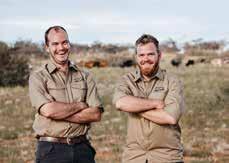

The completely digitized processes save users time and money, regardless of longitude or latitude. And the intuitive, simple user interface of the Saloodo! platform ensures that even customers with little logistics experience, such as the Külbs brothers, have uncomplicated, fast access to the right freight forwarder for their needs.
The plan is working: Europe-wide expansion
Biltong is air-dried beef and, apart from vinegar, salt and a few spices, is free of additives. In Namibia, the “steak on the go” has been a healthy, traditional snack for over 100 years, but it is also finding more and more sales in Germany and Europe. Tourists find the dried meat in the minibars of game lodges in southern Africa, but also at rental car companies for the small hunger in between. Selected German supermarkets are grateful buyers of the African biltong in the wake of the “low carb” and protein food trend, and Europe-wide expansion is also becoming easier for Valentin Külbs thanks to the uncomplicated transport options via digital marketplaces.
Two brothers - two continents - with a partner like Saloodo!
Already since the end of the 1950s, the Külbs family has been engaged in sustainable cattle breeding on their farm “Springbockvley”. After the brothers Valentin and Jonathan Külbs lost their father in a tragic accident at an early age, the young men decided to preserve the family farm. While Jonathan continues the actual farm business with his wife Svenja, Valentin serves and expands the market in Germany and Europe. The goal is to leave more revenue with the farmers and in Namibia through first-class quality of products and services, as well as the reduction of intermediate trade stages in the medium term.
Successful with the right partner
Saloodo! is an innovative digital logistics platform meeting the needs of small and medium-sized companies, such as the cattle farms in Namibia. The platform is the right partner for full loads, part loads and general cargo shipments based on competitive offers - worldwide! Because since the foundation of Saloodo! in 2016, the company has continuously expanded, also outside of Europe, into growth markets such as the Middle East, Africa and South America. Today, Saloodo! already counts more than 30,000 shippers and over 12,000 transport companies among its customers. The platform is available in more than 50 countries on 4 continents.
For the Külbs brothers, this means an efficient, simple solution for their planned expansion in Germany and Europe - whether from Namibia or Germany.
Ugandan farmer takes over as president of Slow Food
Edward Mukiibi. Source: Slow Food
When Edward Mukiibi began to grow tomatoes at his home in Uganda, he had no idea it would change thousands of lives. Including his own.
The young farmer is the new president of Slow Food taking over from Italian founder Carlo Petrini who has led Slow Food since 1986, when it launched in Rome, Italy.
With active communities in over 100 countries, the global movement defends biological and cultural biodiversity, encouraging people to eat and advocate for food that is ‘good, clean and fair.’
Working with policy makers, local communities and activists, Slow Food is quick to adapt to a rapidly changing world, largely because of its enthusiasm for mentoring young leadership. Mukiibi talks of his family’s farm in the small village of Kisoga, in Uganda’s Mukono district. It is here he began working with schools, encouraging students to set up small, organic vegetable gardens. “I studied agriculture at university, and was born in a farming community,” he said.
“My parents have a small farm, where they grew a lot of tropical crops, coffee, bananas, beans, maize... and fruit trees along the boundary.” At university, he says his work with local farmers taught him the value of traditional methods of negative attitude,” he said, adding that Slow Food has always had a strong approach to education through gardens, where students learn to grow their own food.
Inspired by meetings with educators like the iconic Alice Waters, Edie began to collaborate with young leaders from different African countries to revive indigenous farming systems, and their inspirational ‘1000 Gardens In Africa’ project began to pick up speed.
“We have over 3 000 gardens in Africa now, and they are important for food security and sovereignty for communities, families and school. They are also part of our open-air classrooms.” “Most people think a garden just produces vegetables: but it also teaches you how to learn to manage resources, and create dialogue with nutrition and school meals.”
All this, he believes is more important than ever before given the challenges the world faces today. “We are in a climate emergency, and need to act quickly. There is a looming water crisis. We have a food crisis in many parts of the world.”
“Slow Food has also evolved into a complex ecosystem — this gives us the strength to tackle complex challenges using a local approach and local wisdom...” he says. “I have been a farmer all life — my story is part of hundreds of stories out there: We are all part of the change.”
A younger, more diverse leadership is likely to be able to pivot faster and adapt to new challenges. After all, as Edie points out, “the world is growing younger — In Africa alone, 70% of the population is below the age of 40.”
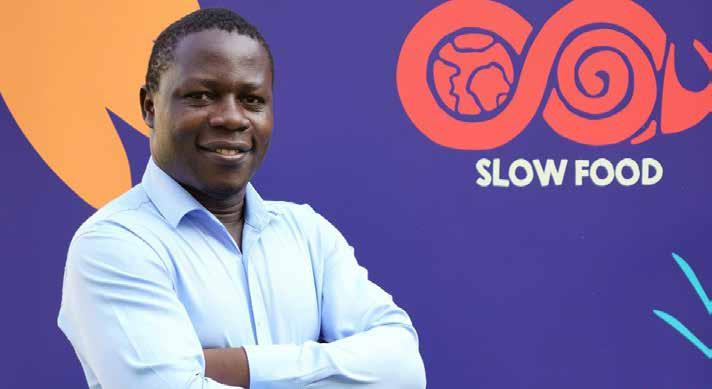
agriculture. “When hybrid seeds failed because of the drought — they were disappointed, and so was I. We realised that with mixed farming, even with drought, farmers would not lose 100% of their crop.”
Mukiibi began to work with the farmers to rebuild traditional systems and rebuild trust.
“We began using regenerative approaches, permaculture and agroforestry. We started working with plants that are resilient, so even with strong winds or drought you will have something to harvest, something to eat. We began working with heritage millet.”
“It was a heavy job to do alone. I started looking for organisations working to truly transform the food system. That’s when I was invited to Slow Food’s Terra Madre event in Italy to share my story.”
“I realised I didn’t make a mistake when I chose to work with resilient agricultural systems. I realised there are millions doing the same work around the world... It is an emotional moment for people feeling lost — you feel you are part of something big, part of a solution.”
He returned to Uganda to work with school gardens. “They were using farming as a punishment for students. I wanted to change that












UFS partners with ZZ2, well-known South African farming and fresh produce company
The University of the Free State (UFS) has formed a partnership with ZZ2 – a well-known South African farming and fresh produce company. The partnership includes the establishment of a company, FreeFarm Innovation, as a vehicle for combined outputs of the university and ZZ2’s diverse, but complementary capabilities, skills, and resources.
Several opportunities relating to research, commercialisation, and the enhancement of various agricultural products have been identified and will form part of the operations of FreeFarm Innovation.
New solutions and practices for the agricultural sector
“Universities are key role players in bridging the theory-practice gap by ensuring that we generate functional knowledge. The UFS is constantly exploring meaningful partnerships to support the improvement of local and global communities and industries. We are excited about the collaboration and partnership with ZZ2 in developing new solutions and practises for the agricultural sector” says Prof Corli Witthuhn, Vice-Rector: Research and Internationalisation at the UFS. “We look forward to involving our top researchers and students in projects under the umbrella of FreeFarm Innovation. Additional areas of collaboration will include, among others, soil science, marketing, logistics, water quality, production systems, plant breeding, entomology, chemistry, and animal science” says Prof Witthuhn.

Shared benefit for partners
“As one of the oldest, most respected institutions of higher education in South Africa, the UFS brings experience, top-class researchers, facilities, technology, and knowledge to the partnership. This is enhanced by ZZ2’s established, reputable, and successful business and network structure within the agriculture sector, both locally and globally,” she says.
The initial key to the partnership will be the development of effective fertilisation products and strategies. “The values of the university to not compromise on quality and impact aligns with ZZ2’s focus on fresh product quality. Further alignment is also achieved through the employee training programmes and the ZZ2 academy,” says Prof Witthuhn.
Advertiser’s index
TO ADVERTISE IN FARMERS REVIEW AFRICA CALL: +27 11 044 8986 | Email: sales@farmersreviewafrica.com
Agritech .................................................................................................03 Agruline..................................................................................................29 Big Dutchman.........................................................................................21 BioCheck................................................................................................23 CHCNAV.............................................................................................OBC Fertilux....................................................................................................35 FRIGORTEC...........................................................................................19 GPCA......................................................................................................33 Humofert.................................................................................................07 Irrigation Association.............................................................................37 KSB Pumps & Valves..........................................................................IBC Marketing Arm........................................................................................41 Microsep.................................................................................................25 Polmac S.R.L..........................................................................................31 Saudi Agriculture Show..........................................................................17 Simmer Enterprises.............................................................................IFC Wood Mizer.............................................................................................45
The publication of this magazine is made possible in part from fees paid by our advertisers. To help our advertisers evaluate the effectiveness of informing you of their company, products and services, and to help us retain our advertisers, tell them that you are contacting them because you saw their advert in the Farmers Review Africa.
